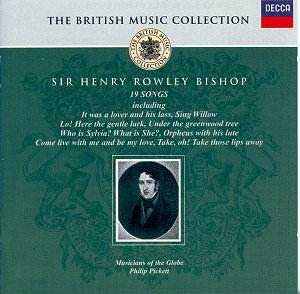Henry Bishop (1786-1855) is largely neglected, if not
derided, but he does have a number of claims to fame. He composed, or
at least used in one of his operas, Home Sweet Home. He was the
first to be knighted (by Queen Victoria, in 1842) for services to music.
He wrote many attractive Shakespeare–inspired songs, some of which I first
encountered some 50 years ago.
The coloratura showpiece Lo! Here the Gentle Lark
was particularly beloved of Amelita Galli-Curci, who made a famous recording
of it and others I enjoyed in my youth were Should He Upbraid
and (not on this CD) Bid Me Discourse. Bishop in fact wrote music
for nine Shakespeare productions at Covent Garden between 1816 and 1821,
four of which are exemplified here.
Bishop, it is said, took liberties with the Mozart
operas he directed in London during the early 19th Century,
leaving out some numbers and replacing them with music of his own composition
(a common enough practice at that time). Similar liberties were taken
with Shakespeare. Who is Sylvia?, in one of the two versions
here, is lifted from The Gentlemen of Verona and jerked into
Twelfth Night as a quintet, using music by Thomas Ravenscroft
and Morley’s It Was a Lover and His Lass (Bishop sets the latter’s
words himself, most attractively).
Under the Greenwood Tree was transferred from
As You Like It to A Comedy of Errors where it became a
male voice quartet but retains Arne's celebrated tune. Bishop also adapted
Flower of This Purple Dye (from A Midsummer Night’s Dream
from J C Smith’s opera The Fairies but sixteen of the tracks
are his own compositions.
To say that his music sounds like Mozart on an off
day is unkind if not too far wide of the mark. To me, such an assessment
is a compliment. Bishop’s Shakespearean music is always tuneful and
well made and I cannot imagine this disc not giving pleasure. The performances
are admirably stylish, even if Philip Pickett’s Musicians of the Globe
tend to be better known for the performance of music earlier in date
than circa 1820.
Susan Gritton sings Lo Here the Gentle Lark
(very secure coloratura here), Should He Upbraid, Sing Willow (did
Sullivan know this?), Come Live With Me and That Time of Year
with beguiling clarity of line and diction. This is lucky, as the booklet
prints none of the words. Gritton is the "lead" singer, though
Julia Gooding sings delightfully too. Gooding is given It Was a Lover
and His Lass, a winning song delivered here with delicious archness,
and Oh Never Say. The Gritton/Gooding duet, Orpheus With His
Lute, is a treasurable moment. I was also taken with tenor Mark
Tucker in his two solos for Oberon in A Midsummer Night’s Dream.
Generally the ensemble and chorus pieces which include a huntsman’s
chorus also for the Dream not much below Weber’s in Der Freischütz,
go very well.
This may not be quite first rate music but it is excellent
work of the second rank and I urge you to explore it. The recording
is very good. Unusually in this British Music Collection series, this
is not a compilation but a straight re-issue of a fairly recent (Philips)
CD first published in 1999.
Philip L Scowcroft


![]() See
what else is on offer
See
what else is on offer 